((Yay! Now we have four members of the party, two Assembly and two Conclave! Still a bit weak, but we will surely ripen with age  ))
))
Sonderweg oder Anderweg? -- An interactive AAR in the Hohenzollerns megacampaign
- Thread starter Avindian
- Start date
-
We have updated our Community Code of Conduct. Please read through the new rules for the forum that are an integral part of Paradox Interactive’s User Agreement.
You are using an out of date browser. It may not display this or other websites correctly.
You should upgrade or use an alternative browser.
You should upgrade or use an alternative browser.
We had 9 people vote 12 months and 7 vote 24 months. I'll give it until the end of today, so please vote if you haven't already.
((Welcome aboard!))
Name: Franz von Bavel-Timmermans
Position: Conclave
Born: 19 July 1831 (29)
Birth Place: Rotterdam, Netherlands
Party: SDAP
((Welcome aboard!))
((And thus, A tie was created (Get jonti)))
((I count 11-7. u wot m8))
((oops.I misread Avs post))((I count 11-7. u wot m8))
All right, then. I'll try to update tonight and we'll begin with 1862 after that.
((Yay))All right, then. I'll try to update tonight and we'll begin with 1862 after that.
1861: Replacing the warfare of nations with the warfare of classes
As German armies pushed east into Poland, west into France, and north into British Africa, the citizens of Germany groaned at the news that their taxes were being increased, just as their sons went off to war.
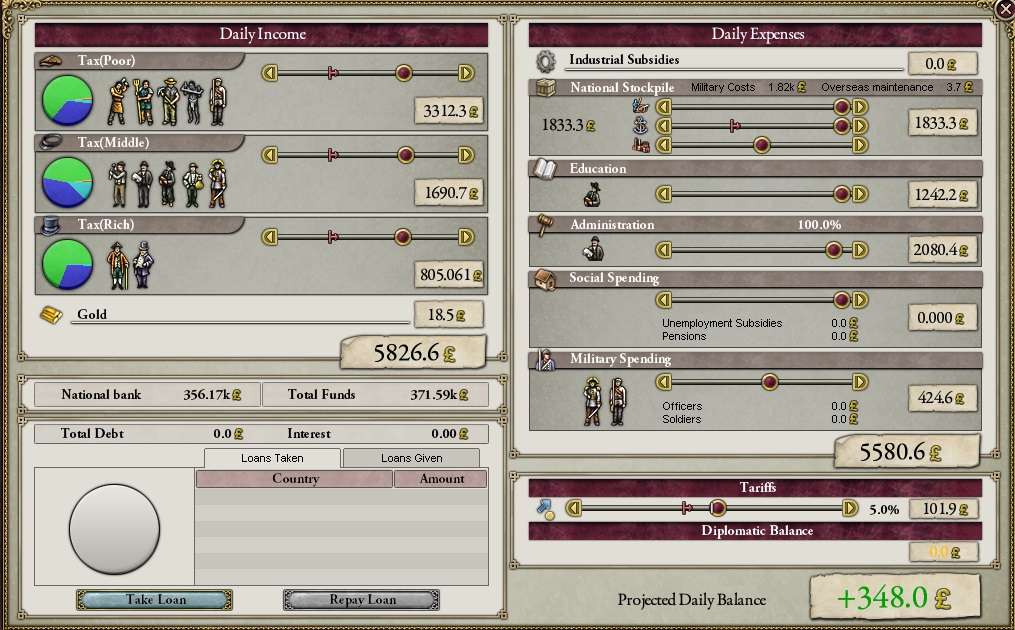
Few reactions were as extreme, however, as that of the arch-conservative Dafydd von Dwyfor. Dwyfor had been captured by British troops after the fall of Plymouth; he'd been visiting relatives when the war came, and persistently ignored overtures to cross the Channel. As a high ranking member of the German government, the British did everything they could to keep him comfortable, which included smuggling in copies of the latest German newspapers. He was so certain he'd read something mistaken that he brought his paper over to the window for a closer look, hoping it was his failing vision that misled him. Unfortunately, it was a cloudy day, so he still had difficulty seeing it. He asked one of his guards for a candle (which they promptly provided), used a match to light the candle and a second to light his pipe. As he read about the plan, his eyes bulged in fury. "Raising taxes?! TARIFFS?! What has Germany come to in my absence? There is only one possible solution. I must escape!"
Dwyfor searched around for a way out. He found the door securely locked and the window barred. He asked the guard if he was allowed to escape; regrettably, the guard explained, escaping was strictly against the rules. Dwyfor, not to be so easily dissuaded, checked the floor, and found to his delight a few loose cobblestones. Using his pipe, he pried a couple of them up, to find the dirt very soft and easy to dig through. He spent a few days digging straight down, trying to see if he'd hit the ceiling of the next chamber or bedrock. Much to his surprise, he plunged into a very dry chamber and fell a few feet onto what he thought was sand. He grabbed his ever-present pipe and lit it to see what he'd discovered. His final thoughts were "Since when is sand black?"
The result could be seen for miles around. Upon hearing the news, Chief of Staff Unger was heard to remark, "So that's where we put that powder reserve before we left!" before he resumed war planning.
Unger had placed a lot of his political capital into winning this war, and if he was successful, he hoped to used that momentum to secure the Chancellery after Bismarck's constitutionally mandated departure at the end of 1862. As he penciled Ferdinand Beck-Rzikowsky to take over a militia army in Berlin and cut orders to order them east into Poland, he got terrible news of a disastrous defeat at Amiens.
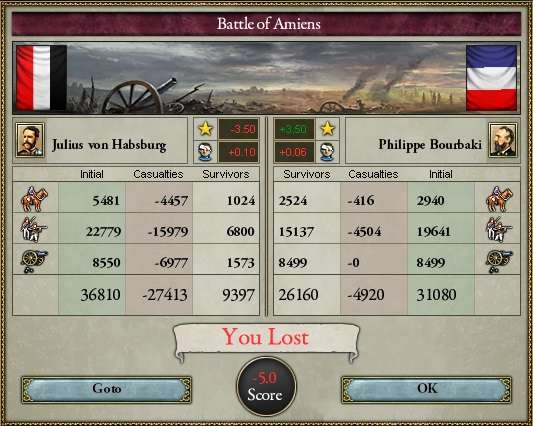
Coming so soon after the bloodbath at Dunkirk, Amiens rocked Germany. France was supposed to be the easy part; take Paris and watch France surrender, again, to Germany. Nobody told Philippe Bourbaki anything of the sort, however. He vowed to continue fighting for France's eternal ally, Poland, regardless of the consequences. Some of the more vocal radicals started to insist on Germany's withdrawal from the war. Any number of minor victories in the days after Amiens could do little to restore German faith in her army and its Chief of Staff. Even when it secured a major victory, completely eliminating the last of the British troops in France at Arras, it was immediately followed by another bloody defeat, this time on German soil.
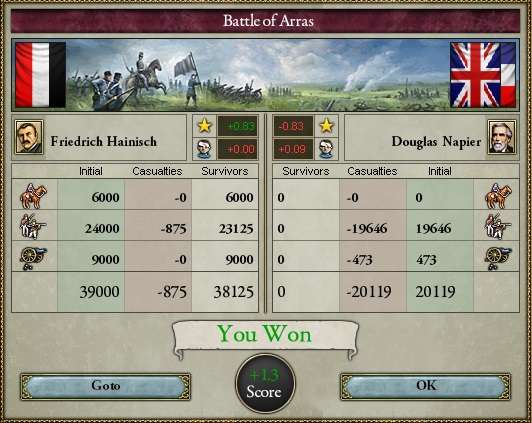
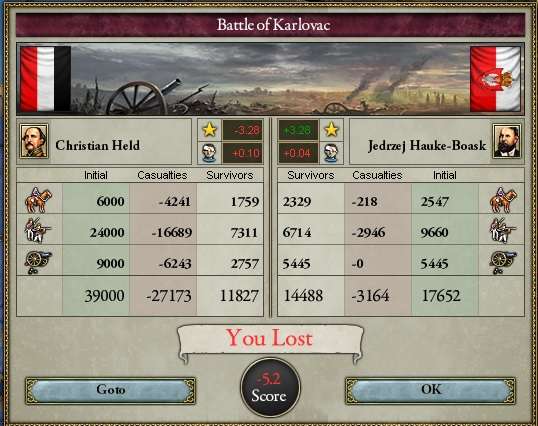
Karlovac was, if possible, even worse for the German government than Amiens. The Poles had only local numerical superiority, against the superior experience, tactics, and technology of the German armies. Yet not only had they defeated a German army on German soil, they had done so without even their local superiority! Christian Held was immediately court martialed for his defeat, and some reserve armies were ordered south to bolster Held's troops. Back in France, Germany won the Second Battle of Amiens, but at a frightful cost in men.
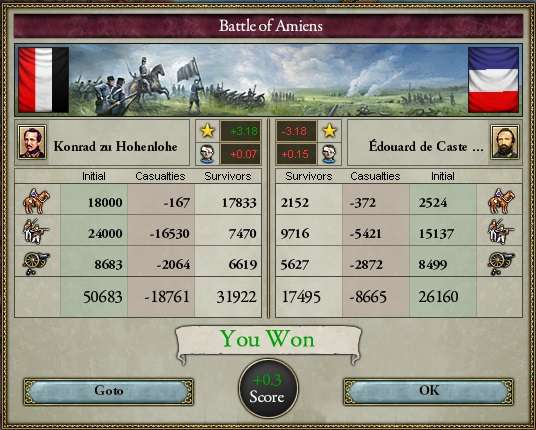
If not for the Battle of Lodz, Hugo Unger's nascent political career would have ended abruptly. Yet for all of the casualties in both Poland and France, Unger had done something few other observers realized: he'd virtually destroyed the trained core of both armies. He was getting into the poorly trained militia now, while German militia merely served on occupation duty for the most part. Lodz was a clear example of the superiority of German combined arms.
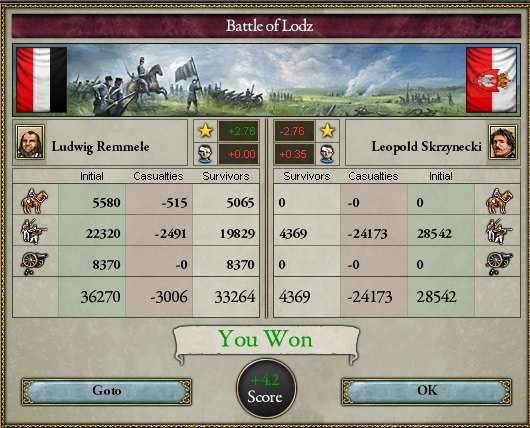
February 1861 opened with a cautious sense of optimism; even the defeats at the end of January had been minor, and victories both plentiful and meaningful. Warsaw capitulated on 13 February 1861, and while Polish diplomats insisted war could and would continue, Foreign Minister von Hohenstaufen noted a quiet sense of desperation in their protests. The last of General Bourbaki's French army was routed at the Battle of Caen on 7 March -- but mere hours later came the most embarrassing episode in the history of the German navy.
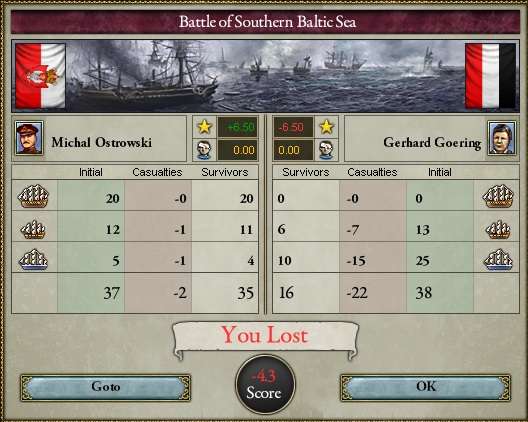
The sleek, modern Commerce Raiders of the steam fleet were battered into submission by Polish Men o' War. The Age of Sail was not yet finished, it seemed, not until a vessel capable of countering the largest wooden ships was devised. HUN and New Society newspapers started to vocally attack the Minister of Education, Carlo Brunelli, for denying military projects funding in favor of still more government-operated philosophy programs. Such protests fell on deaf ears, and when it came time to find a new project to support at the end of 1861, Brunelli cheerfully pushed for experimental psychology.

The increasingly nasty editorials against Brunelli spurred a brief uprising in Siena. This minor uprising gave Held a chance to reclaim some of his dignity, as he marched into Italy to put it down. 23 March saw a Polish army eradicated at Przemysl as fortresses in France and Poland continued to succumb to German assaults. A militia relief force tried to recapture Warsaw, only meet to its own absolute destruction at the hands of Anton Haynau and his artillery. 33,000 more Poles surrendered at Radom; not a single professional soldier was among them. The Battle of Radom marked a momentous day for German forces, as it saw a shift from engaging enemy armies to taking enemy territories. The Minister of War, Hals Gutfreund, determined that for propaganda purposes, even the most horrific defeats could not erase the relentless pace of German conquest.
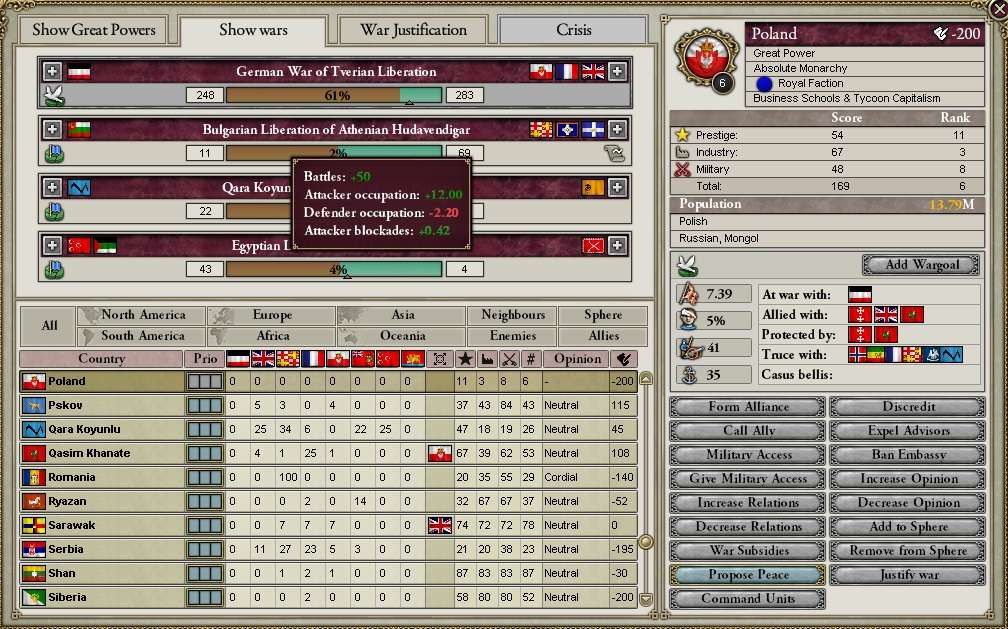
The tipping point had been reached; the only thing that could bring down German would be a mass, popular uprising against Chancellor Bismarck and his government. The first hint of real strain in the Republic of Germany came at the end of April, when some Greek citizens tried to peacefully protest the war and, in particular, the members of their community being drafted into the army.

Ominously, among those individuals who were arrested in Campania were some pamphlets signed by a man who only called himself "Plato." These pamphlets were popularly attributed to Karl Marx, who later admitted that he shared some funding with the Byzantine politician, but he roundly rejected socialism as "a destructive force, one that sought to take away man's freedom to do as he must and give that freedom to the state." Marx spent most of the rest of his life denouncing the evils of socialism, but he saw donations to the Jacobins dry up as they went to the Socialist International's headquarters in the Byzantine Empire.

Fighting continued on all fronts. In June, Venice triumphantly proclaimed that it had overtaken Transylvania as a Great Power, in large part because Transylvania had opted to stay out of the crisis with Poland. In a very costly but effective attack, some of the last Polish regulars surrendered to the first German army that was largely comprised of militia.
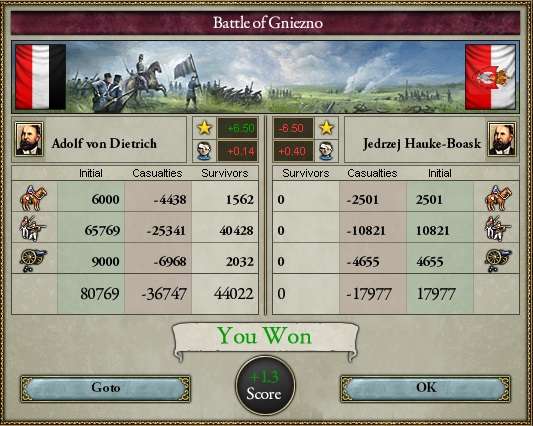
By July, Germany was properly victorious, yet Poland refused to accept defeat. The lands claimed by Tver had yet to be touched by German boots, the Polish diplomats proclaimed, and until they had Poland's duty was to fight to prevent the dissolution of her motherland. The news that this incredibly bloody war continued led to some Wallonian nationalists bombing a government facility in Groningen.

Michael von Hohenzollern, the Minister of the Interior, ordered an incredibly detailed investigation that resulted in the arrest of most of the cell ringleaders. The Minister seemed almost saddened when he reported that no Socialist propaganda had been found on the criminals. The Jacobins won one of their last major victories in Hungary, but the Jacobins were the wave of the past.

Nationalism continued to be a threat to Germany, even if Jacobinism wasn't. The French General Bourbaki had escaped German custody and rallied French speakers all along the Franco-German border to "resist the Hun" and "restore France to her proper glory."
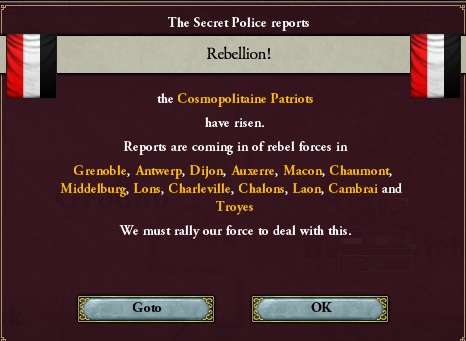

Nearby militia members were ordered into action to put down the rebellion, even as France itself was occupied by German armies. Spurred by the success of the French uprising, some Greeks tried the same thing in Puglia -- and were arrested for their trouble.
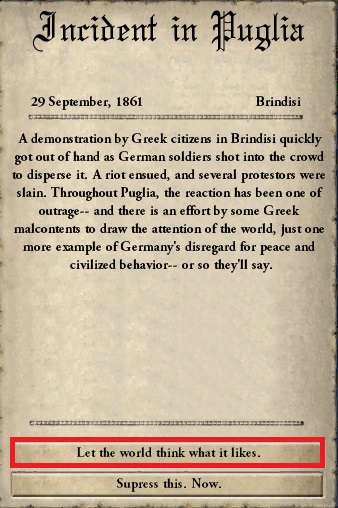
A second wave of tensions erupted in German-held Burgundy, where a second outbreak of French patriotism threatened to envelop the region.
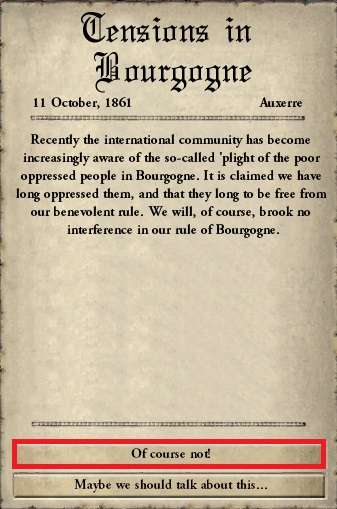
As French rioters rampaged through Western Germany, the most pressing need became the need to end the war. Even an attempt to get Douglas Napier, Britain's finest commander, to Africa did little to impede the relentless drive of Germany against her enemies and finally, on 5 December 1861, Poland sued for peace. Germany quickly signed a treaty of Eternal Friendship with the new Republic of Tver.
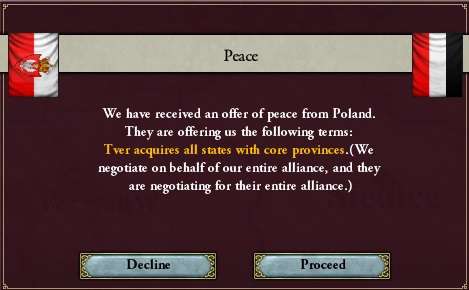
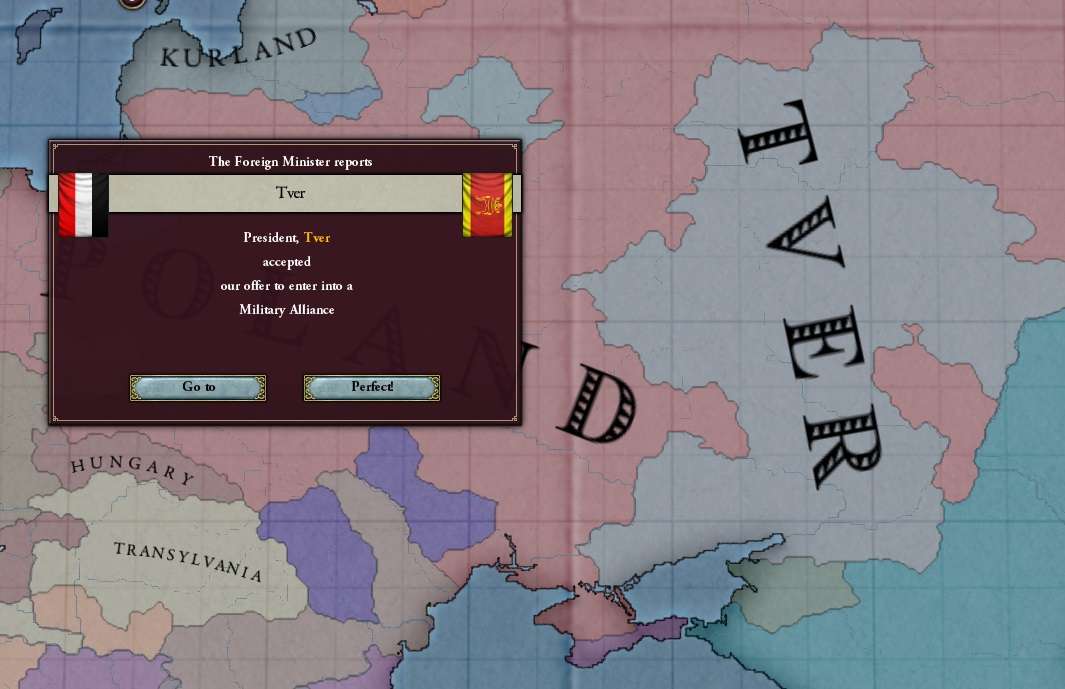
Even revolution seemed to have left Europe for the time being; it had moved onto Asia, as anti-Jacobin groups moved to evict and exile any monarch with even the slightest liberal leanings.
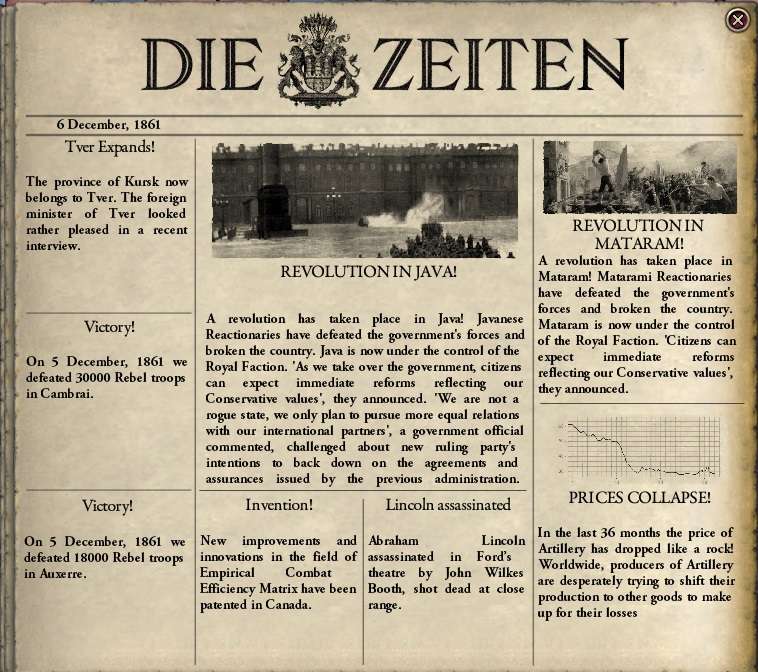
To try to restore some air of normalcy to German relations, the Minister of War took the somewhat controversial move to demobilize the German militia. However, only one rebel army remained, and as soon as that was crushed, peace would return to Germany. Yet that did not entirely dispel the sense of unease. The formation of the SDAP, the first party dedicated to Pacifism since the DDA had abandoned that policy in the past, was making serious headway in some local elections, and could probably capture a significant part of the 1862 Reichstag. Hugo Unger hoped to build a coalition against them and become the first HUN Chancellor. With Bismarck ineligible to run for a fourth term, he resigned himself to playing kingmaker in the background, retaining his seat as a party leader. The UAI and DDA remained wildcards; would they join with the SDAP, or try to marginalize the new, more radical party? Only the Imperialists remained predictable, continuing to promote a heavily nationalist platform and shouting down anybody who argued for local autonomy.
The 1862 elections could be the most contentious in the history of the Republic.
You have 48 hours to introduce constitutional amendments or any legislation that would require both houses to vote on it. Do not vote until I have officially called for one on any pieces of legislation. After that period expires, we'll look for plans from our ministers and then move forward!
(( Such sarcasm at the beginning. I'm almost tempted to ask your opinions on American politics, phrasing questions in the most extreme manner possible. Then again, I don't know if any sense of humor can avoid bile when it comes to American politics.
More on point, am I correct in understanding that the peace with Poland ended the whole war?
Finally, which techs are valid for us to pursue now or in the very near future?
Not so finally, Tver placed like that makes me kinda disgusted at how the EU3->Vic2 converter did some things. I'm porting improvements from EU4->Vic2, but it still makes me sad how some bits never did get advanced. ))
More on point, am I correct in understanding that the peace with Poland ended the whole war?
Finally, which techs are valid for us to pursue now or in the very near future?
Not so finally, Tver placed like that makes me kinda disgusted at how the EU3->Vic2 converter did some things. I'm porting improvements from EU4->Vic2, but it still makes me sad how some bits never did get advanced. ))
Assemblyman Defarge Still Bed-Ridden!
Nearly five months after the French Riots, Jérôme Defarge, former Minister of War, one-time Deputy Foreign Minister and member of the Assembly for twenty-five years, has yet to recover from the injuries sustained while attempting to talk down a mob during that dark time. His family have made it clear that he will formally resign as soon as the 1862 elections are finished.-Die Zeiten, 6 December 1861, page 2
((Still not sure what I want my new character to be, so the old Frenchman will linger a little longer.))
The result could be seen for miles around. Upon hearing the news, Chief of Staff Unger was heard to remark, "So that's where we put that powder reserve before we left!" before he resumed war planning.
(( :rofl:
I'm curious as to how far the different rebel movements have gone and how many members they have. Can I see the movements screen if it's not too much to ask?))
The loss of life is unfortunate and every German soul shall be missed, but the Tverian people are free. Germany has once again proven itself as the world's premier power. The French, British, and Poles will think twice before trifling with Germany again.
I must admit that freeing a people is a noble cause, but was the loss of life worth it? This victory will only be the cause for more war and strife, within twenty years we will be at war again, and the loss of life will be even greater. We are currently promotig a cycle of voilence and death, do we really want that?
Franz von Bavel-Timmermans, Stadtholder of Rotterdam
Franz von Bavel-Timmermans, Stadtholder of Rotterdam
Finally we have beaten our enemies into submission at the cost of brave german men, who is now heroes and someone everyone should look up too. This great victory shall never be forgotten. And every loss of life is worth it, if it support our noble causes.
~Konrad von Schwaben, Head of the Corps of the Gendarmerie
~Konrad von Schwaben, Head of the Corps of the Gendarmerie
Last edited:
Few reactions were as extreme, however, as that of the arch-conservative Dafydd von Dwyfor. Dwyfor had been captured by British troops after the fall of Plymouth; he'd been visiting relatives when the war came, and persistently ignored overtures to cross the Channel. As a high ranking member of the German government, the British did everything they could to keep him comfortable, which included smuggling in copies of the latest German newspapers. He was so certain he'd read something mistaken that he brought his paper over to the window for a closer look, hoping it was his failing vision that misled him. Unfortunately, it was a cloudy day, so he still had difficulty seeing it. He asked one of his guards for a candle (which they promptly provided), used a match to light the candle and a second to light his pipe. As he read about the plan, his eyes bulged in fury. "Raising taxes?! TARIFFS?! What has Germany come to in my absence? There is only one possible solution. I must escape!"
Dwyfor searched around for a way out. He found the door securely locked and the window barred. He asked the guard if he was allowed to escape; regrettably, the guard explained, escaping was strictly against the rules. Dwyfor, not to be so easily dissuaded, checked the floor, and found to his delight a few loose cobblestones. Using his pipe, he pried a couple of them up, to find the dirt very soft and easy to dig through. He spent a few days digging straight down, trying to see if he'd hit the ceiling of the next chamber or bedrock. Much to his surprise, he plunged into a very dry chamber and fell a few feet onto what he thought was sand. He grabbed his ever-present pipe and lit it to see what he'd discovered. His final thoughts were "Since when is sand black?"
The result could be seen for miles around. Upon hearing the news, Chief of Staff Unger was heard to remark, "So that's where we put that powder reserve before we left!" before he resumed war planning.
((That was absolutely fantastic! I'll have my new character ready by the end of the day.))
((That was absolutely fantastic! I'll have my new character ready by the end of the day.))
((What a way to go!
((Idhrendur: Since it was Poland's crisis, Poland was war leader and thus the war is over. If you want tech information, ask Brunelli, who gave me a list a long time ago and we're still working through it. 
Michaelangelo -- will try to get you the info this evening.))
Michaelangelo -- will try to get you the info this evening.))
My fellow Sozialdemokraten,
Today is a day to be celebrated.As from today, the entirity of the People of the Republic have an opinion in the government.No longer shall the poor be oppressed by the Aristocracy and the Rich.I shall explain to you why this is happening and why we must end this. .The Industrial Revolution, as it is being called,has not only caused benefits.Machines taking over work from people is seen more and more, and these people, now without a job and a family to feed become poor and who cares about them ? NOONE.They, the people who work or have worked hard to earn their bread, who fight and fought our wars, and keep and kept the German Republic running, are being left behind , like they are slaves in the ancient Roman times.Thus I say, Gentlemen we must improve their situations, or face the dire consequences of a revolution of the People of the German Republic
Yours Sincerely ,
Heinrich von Gogh,Leader of the SDAP and Assemblyman
((Also, I have finally found a form I want to use on this forum ))
))
Today is a day to be celebrated.As from today, the entirity of the People of the Republic have an opinion in the government.No longer shall the poor be oppressed by the Aristocracy and the Rich.I shall explain to you why this is happening and why we must end this. .The Industrial Revolution, as it is being called,has not only caused benefits.Machines taking over work from people is seen more and more, and these people, now without a job and a family to feed become poor and who cares about them ? NOONE.They, the people who work or have worked hard to earn their bread, who fight and fought our wars, and keep and kept the German Republic running, are being left behind , like they are slaves in the ancient Roman times.Thus I say, Gentlemen we must improve their situations, or face the dire consequences of a revolution of the People of the German Republic
Yours Sincerely ,
Heinrich von Gogh,Leader of the SDAP and Assemblyman
((Also, I have finally found a form I want to use on this forum
Last edited:
I must admit that freeing a people is a noble cause, but was the loss of life worth it? This victory will only be the cause for more war and strife, within twenty years we will be at war again, and the loss of life will be even greater. We are currently promotig a cycle of voilence and death, do we really want that?
Franz von Bavel-Timmermans, Stadtholder of Rotterdam
Hear, hear!
I am happy the people of Tver are free from Polish barbarism. But this war showed the failure of German imperialism. We lost hundreds of thousands of men to satisfy the needs of aristocrats who want to proclaim German hegemony.
To combat this pernicious strain of imperialism, Germany will continue to fund philosophy programs.
-Carlo Brunelli
((I completely forgot what techs I ordered, I just know I intentionally left out military stuff

